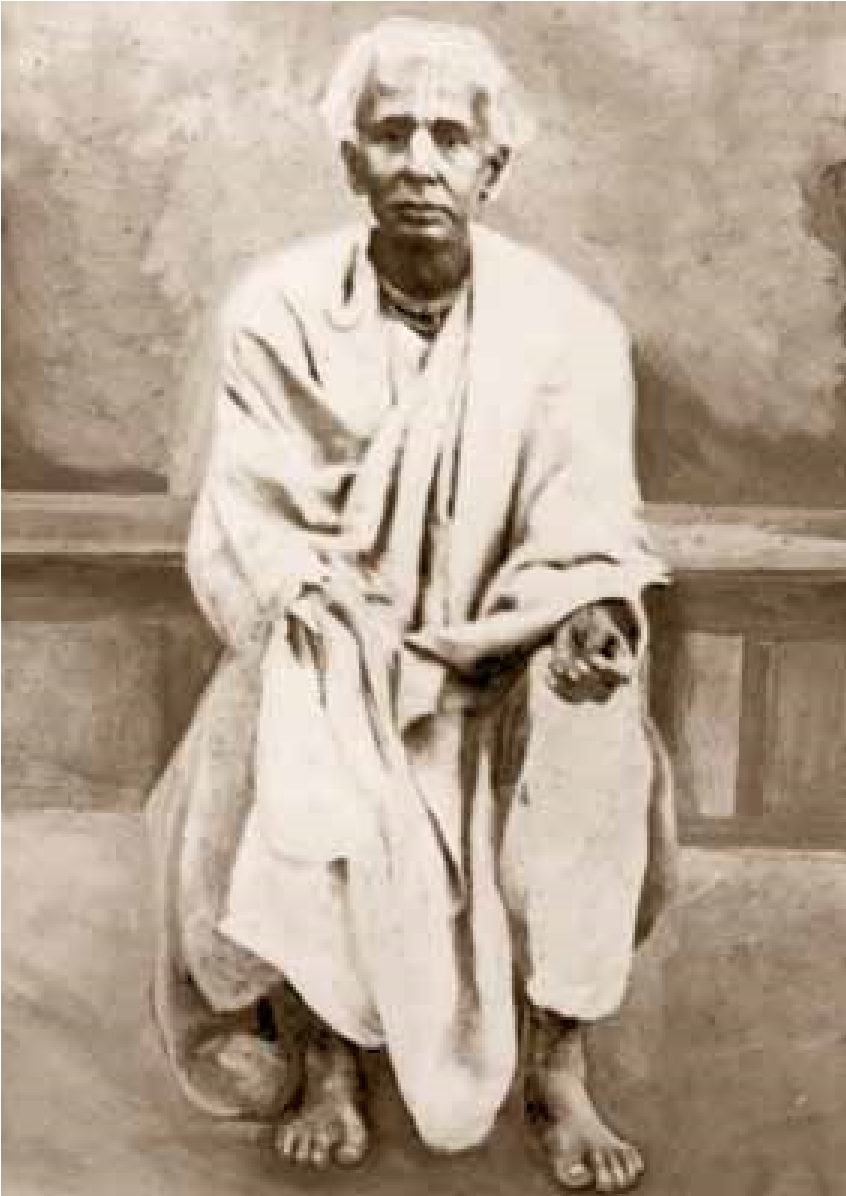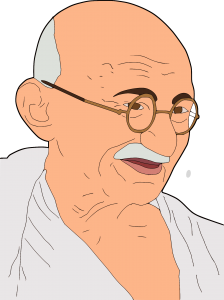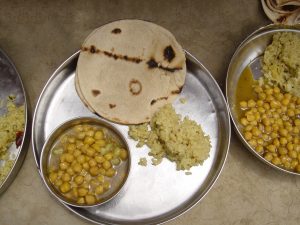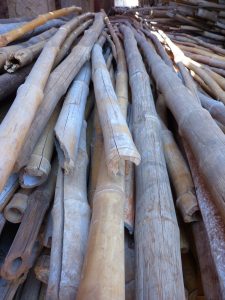
On 30 January 1948, Nāthūrāma Goḍse shot Mahātma Gāndhī at the Delhi prayer  assembly. On that very same day, ajātaśatru pūjyapāda Śrī Narahari Brahmacārī Sevāvigraha Prabhu disappeared from this world in Śrī Navadvīpa-dhāma, during the brahma-muhūrta hour. At that time, Śrīla Gurudeva was preaching in the Medinīpura area. When he returned to Chuṅchurā on 1 February, he received a telegram from Śrī Mahānanda Brahmacārī with this heartbreaking news, and became stunned like a stone. When his external consciousness returned a short time later, he began to cry, overwhelmed by the piercing separation.
assembly. On that very same day, ajātaśatru pūjyapāda Śrī Narahari Brahmacārī Sevāvigraha Prabhu disappeared from this world in Śrī Navadvīpa-dhāma, during the brahma-muhūrta hour. At that time, Śrīla Gurudeva was preaching in the Medinīpura area. When he returned to Chuṅchurā on 1 February, he received a telegram from Śrī Mahānanda Brahmacārī with this heartbreaking news, and became stunned like a stone. When his external consciousness returned a short time later, he began to cry, overwhelmed by the piercing separation.
Śrī Sevā-vigraha Prabhu was one of the foremost disciples and intimate servants of jagad-guru Śrīla Bhaktisiddhānta Sarasvatī Gosvāmī Prabhupāda. Our most worshipful Śrīla Gurupāda-padma had a very close friendship with him; they lived together for a long time and served Śrī Dhāma Māyāpura in countless ways. Śrīla Prabhupāda turned over the entire responsibility for Śrī Dhāma Māyāpura to this dear servant and could then preach śuddha-bhakti everywhere with a peaceful mind. [After Śrīla Prabhupāda’s disappearance,] Śrī Sevāvigraha Prabhu and Śrīla Gurudeva left Caitanya Maṭha together and established Śrī Devānanda Gauḍīya Maṭha in Śrī Dhāma Navadvīpa. Like Śrīla Prabhupāda, Śrīla Gurudeva entrusted the whole responsibility of Śrī Devānanda Gauḍīya Maṭha to Śrī Sevā-vigraha Prabhu and could thus preach peacefully everywhere.
In the first issue of Śrī Gauḍīya-patrikā, the main magazine of the Samiti, Śrīla Gurudeva wrote an essay entitled Viraha-māṅgalya, about Sevā-vigraha Prabhu. “The torment I feel by not being able to see Śrī Gurupāda-padma and Ṭhākura Narahari Sevā-vigraha Prabhu, who was devoted solely to serving him, mingles with my pen, causing it to falter at every step and proceed so slowly across the page.
“Śrīla Prabhupāda was very pleased to discover his intimate servitor, pūjyapāda Śrī Narahari Brahmacārī Sevā-vigraha. He handed over the whole responsibility of his beloved ākara-maṭharāja, Śrī Caitanya Maṭha, to him and happily went to far distant places to preach pure bhakti with full concentration. … O Narahari Dā! Your uninterrupted service to Hari, Guru and Vaiṣṇavas will manifest of its own accord in the memory of anyone who takes your auspicious name. You are the embodiment of Śrīla Prabhupāda’s dear-most Śrī Caitanya Maṭha; when we lived with you, we all thought that we were living in the Caitanya Maṭha. You have performed the ideal service in a way that is supremely blissful and free from anger. This is the sole aim and objective of Śrī Gauḍīya Vedānta Samiti.”
Śrīla Gurudeva also glorified his best friend, Śrīla Narahari Ṭhākura, in his preface to Prabandhāvali, which was presented on Śrīla Bhaktivinoda Ṭhākura’s disappearance day. In that preface he described him as a brilliant star of the Gauḍīya Vedānta Samiti who is eternally immersed in the flow of nectar coming from Śrīla Bhaktivinoda Ṭhākura.
Śrīla Narahari Sevā-vigraha Prabhu appeared in the famous Vasu dynasty of the village of Deyāḍā in the Yaśohara district of East Bengal. In his early life he and his family were initiated with the śakti-mantra, but he and the majority of his family members were later influenced by Vaiṣṇava association and were initiated into the kṛṣṇa-mantra, and all began to perform sādhana-bhajana. When his elder brother left this world, Śrī Narahari renounced his family and this material world, and took shelter at the lotus feet of jagad-guru oṁ viṣṇupāda Śrī Śrīmad Bhaktisiddhānta Sarasvatī Prabhupāda. Śrīla Prabhupāda was pleased with Śrī Narahari’s versatile abilities and service mentality, and appointed him manager of Śrī Caitanya Maṭha.
Śrī Narahari was like a mother in nurturing the young boys who lived in the maṭha. Every  day he would wake them up, feed them and take care of them. Because of this sweet, affectionate behaviour, the maṭha residents referred to him as ‘the mother of the Gauḍīya Maṭha’. But everyone, young and old, addressed him as ‘Narahari Dā’. He was always chanting śrī harināma and was totally absorbed in the various services of the maṭha. No one knew when he slept and when he woke. Sometimes in the deep night, when everyone else was sleeping, he would sit in his secluded bhajana-kuṭī and chant śrī harināma with vipralambha-bhāva (feelings of separation from Śrī Śrī Rādhā-Kṛṣṇa). We have heard that he sometimes used to tie his śikhā to a wooden handle high on the wall to force himself to stay awake while he chanted harināma. No maṭha resident ever saw him become angry. Even if someone needed to be chided for some special reason, he would scold them sweetly while smiling with great affection.
day he would wake them up, feed them and take care of them. Because of this sweet, affectionate behaviour, the maṭha residents referred to him as ‘the mother of the Gauḍīya Maṭha’. But everyone, young and old, addressed him as ‘Narahari Dā’. He was always chanting śrī harināma and was totally absorbed in the various services of the maṭha. No one knew when he slept and when he woke. Sometimes in the deep night, when everyone else was sleeping, he would sit in his secluded bhajana-kuṭī and chant śrī harināma with vipralambha-bhāva (feelings of separation from Śrī Śrī Rādhā-Kṛṣṇa). We have heard that he sometimes used to tie his śikhā to a wooden handle high on the wall to force himself to stay awake while he chanted harināma. No maṭha resident ever saw him become angry. Even if someone needed to be chided for some special reason, he would scold them sweetly while smiling with great affection.
The following incident took place when I was new in the maṭha. I was young then, and very energetic. In the morning, the local farmers would bring vegetables, milk and other products from their neighbourhoods to the vegetable market on the street just outside the maṭha. Śrī Sevā-vigraha Prabhu and Śrīla Narottamānanda Brahmacārī went outside on the side of the road and began to bargain for vegetables for the maṭha. The farmers were an unruly lot, and they quarrelled about everything. One time one of them struck Narottamānanda Prabhu on the head, drawing blood. Hearing the tumult, I came out, and when I saw the blood on Prabhujī’s head, I lost all self-control. I took a piece of bamboo from the courtyard of the  maṭha and hit that insolent farmer on his back so hard that the bamboo broke and the farmer fell to the ground. In a moment, hundreds of farmers assembled and began to create an uproar, threatening to attack the maṭha. However, pūjyapāda Śrīman Sevā-vigraha Prabhu calmly and peacefully settled this difficult situation with great expertise. First, he caught me and locked me up in a room in the maṭha. Then he confronted the crowd alone, and pacified them all.
maṭha and hit that insolent farmer on his back so hard that the bamboo broke and the farmer fell to the ground. In a moment, hundreds of farmers assembled and began to create an uproar, threatening to attack the maṭha. However, pūjyapāda Śrīman Sevā-vigraha Prabhu calmly and peacefully settled this difficult situation with great expertise. First, he caught me and locked me up in a room in the maṭha. Then he confronted the crowd alone, and pacified them all.
Sevā-vigraha Prabhu had a very affectionate manner. He went to the home of all sorts of people and spoke hari-kathā. He took an interest in people’s happiness and distress, and they endured their difficulties because of his sweet words.
Śrīla Gurudeva could never forget his dear godbrother. Whenever he remembered Śrī Sevā-vigraha Prabhu, he became overwhelmed with feelings of separation. Śrīla Gurudeva named the huge entrance gate of Śrī Devānanda Gauḍīya Maṭha ‘Śrī Narahari Toraṇa’ in Śrī Sevā-vigraha’s memory. This can still be seen today.
―Śrīla Bhaktivedānta Nārāyaṇa Mahārāja (Ācārya Kesarī – His Life and Teachings)
Image/Art made possible by Krishnapath.org








